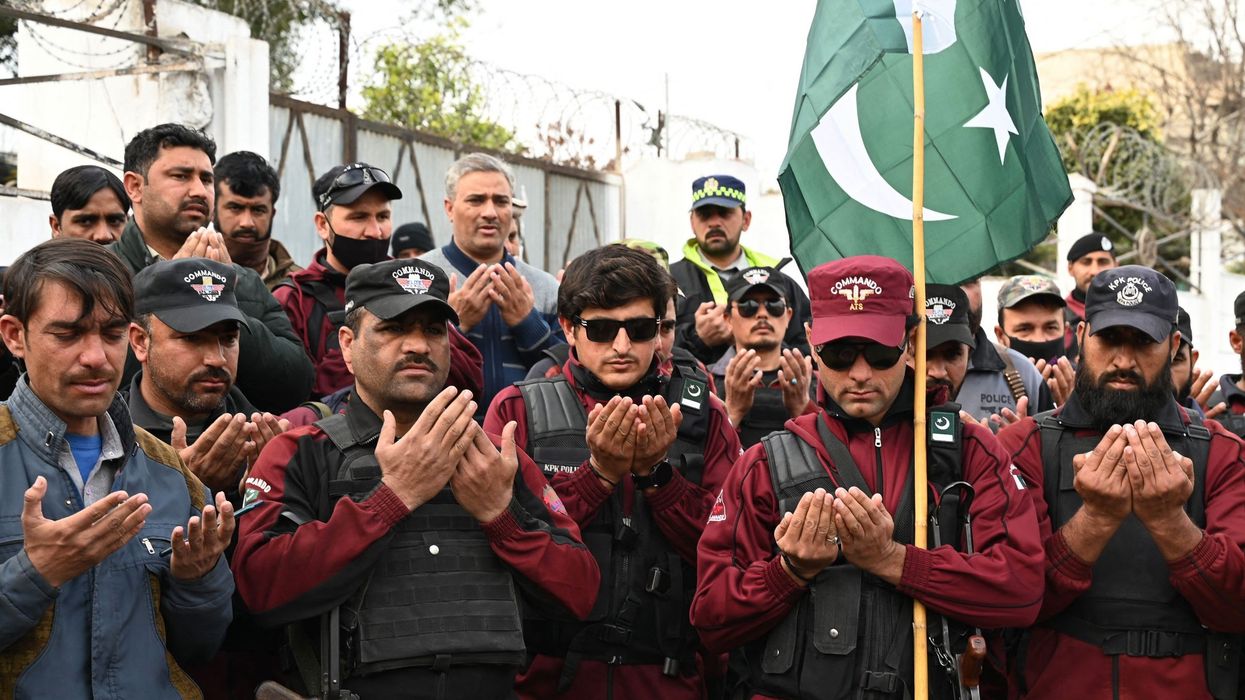A Taliban suicide bomber who killed 101 people, including 97 policemen, at a mosque inside a major police facility in Pakistan's Peshawar city had disguised himself in a police uniform to sneak into the high-security zone and was riding a motorcycle with a helmet and mask on, a top police official said on Thursday.
The guards at the security checkpoint at the main entrance of the Police Lines area did not check the bomber dressed in police uniform and let him go inside, Inspector General of Police of Khyber-Pakhtunkhwa Moazzam Jah Ansari told the media here.
"This was a suicide bomber and we have traced him...We have obtained the CCTV footage of his movement from Khyber Road to the Police Lines... then how he parked his motorcycle on a side...he was in a police uniform and was wearing a mask and a helmet," the officer said.
He confirmed that the severed head found from the blast site was of the attacker.
Ansari said that security guards at the entrance of the Police Lines failed to "check the attacker because they thought he was their own".
He added that the attacker had also asked about the way to the mosque from a police officer. The bomber asked a 'havaldar' where the mosque was in Pashto language, he said, adding that this means that the attacker was not aware of the area.
"He was given a target and there is an entire network behind him...he was not a lone wolf," Ansari said, adding that the police were close to the terrorist network responsible for the bombing.
Sources earlier said the security agencies have arrested 17 suspects involved in the devastating blast - the deadliest attack on security personnel in decades in Pakistan.
The arrests have been made from the close vicinity of the Police Lines area where the mosque is located and the suspects were shifted to an interrogation cell for investigation, sources told PTI on condition of anonymity.
The suicide bomber blew himself up during the afternoon prayers on Monday in the mosque in the Police Lines area, killing 101 people and injuring more than 200 others.
The banned Tehreek-i-Taliban Pakistan (TTP) claimed responsibility for the attack.
However, the group later distanced itself from the attack.
"The TTP claimed responsibility for the blast...But then they disowned it. It seems that they consulted among the group and realised that they will be criticised for attacking a mosque,” he said, adding that technical evidence and information collected by sensitive institutions suggested that the blast was the work of TTP’s Jamaat-ul-Ahrar faction.
"We can clearly say through all the evidence that Jamaat-ul-Ahrar, TTP and a hostile intelligence agency working against the national security of Pakistan is behind it," he said. He did not name the "hostile intelligence agency." "We know the people responsible for it, we know the handlers and the operators as well," he said.
Ansari said that TNT, a high explosive, was used in the blast, while explosive materials used to demolish buildings were also used.
No improvised explosive device (IED) was used in the blast as no crater was found on the ground, Ansari said, adding that 5 to 10 people were killed due to the explosion, but the majority of people died as the roof caved in because it was not supported by any pillars in the hall.
The headquarters of the Peshawar Police, Counter-Terrorism Department (CTD), Frontier Reserve Police (FRP), Elite Force and telecommunications department are also located near the blast site.
The blast shocked residents in Peshawar - once known as "the city of flowers".
The policemen took out a protest rally in Peshawar on Wednesday demanding fair and transparent investigation into the deadly bombing. The speakers of the rally demanded the formation of a Joint Investigation Team to probe the blast.
Warning anyone resorting to protest again will be fired from their job, the IGP said the policemen are being misled by some quarters.
It gives me pain when people mislead my children (policemen) and I'm trying to address their problems, Ansari said.
He urged policemen to fight out the terrorists and not to resort to protest demos.
The IGP also clarified that the rumours of a drone attack were false.
"We will release all the details of where the conspiracy was hatched and who were the facilitators. This is a security lapse on my part, I don't want to put the blame on my officers," he said.
"We are closing in on the network. Every life of our martyrs will be avenged,” he added.
In her weekly press briefing on Thursday, Foreign Office spokesperson Mumtaz Zahra Baloch said the government had begun investigations into the Peshawar attack and Pakistan expected cooperation from the Afghan interim government in the probe.
Army chief Gen Asim Munir has vowed zero tolerance for terror groups and directed his generals to eliminate the threat of militancy.
In a statement, Prime Minister Shehbaz Sharif said on Wednesday that the entire nation and institutions are united to eliminate the menace of terrorism.
Describing police as a front-line force in the fight against terrorism, the prime minister said that they will be further strengthened and equipped with modern weapons.
Speaking at a meeting of the federal cabinet in Islamabad on Wednesday, Sharif expressed serious concerns over the resurgence of terrorist elements especially in Khyber Pakhtunkhwa province, bordering Afghanistan.
The Prime Minister said that if immediate and effective steps were not taken, the despicable incidents might spread to other parts of the country.
(PTI)




